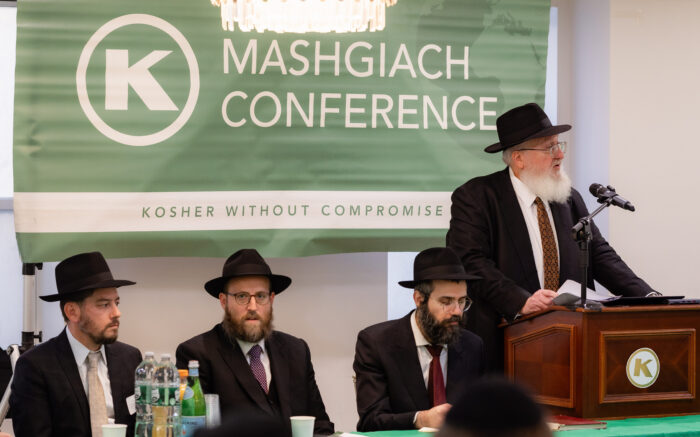I think back to erev Pesach of a few short years ago. Cleaning the house amidst a deafening silence. How I wished for the loud, jubilant, children’s shrieks like the ones coming from the homes of my neighbors. How I pined for the noise and chaos of overzealous boys and girls off from school and busy with pre-Pesach chores. But I was not blessed with children.
Wherever I went there was the harsh reminder that I was without children. Supermarkets were especially difficult. Bustling with mothers and their children, or groups of siblings. I would quietly observe how they interacted with each other. Noting how it wasn’t easy towing several youngsters around while shopping, while being painfully aware of how much I would give to be able to do just that. Yet the most difficult times for me were holiday meals and Yom Tov mornings. While I could always slip out of the grocery store undetected, donning my blessed sunglasses to hide the tears forming in the corners of my eyes, at the seder it was almost impossible to avoid revealing the sadness that bubbled inside me.
It didn’t matter much if we were at my parents’ house or my in-laws’, or even at a friend’s home; the pitying glances borne out of love and concern were a constant companion. During the Mah Nishtana (the four questions traditionally asked by the children at the seder), my husband and I stared intently at our Haggados, not daring to look up into the smiling eyes of our delighted, curious, proud nieces and nephews. Someone else’s children. Wherever we’d go, we played the roll of the calm, unhurried couple who would help set the table, serve and clear – because there were no little ones demanding our attention. We would sit at the seder table uninterrupted by crying infants, cranky babies and sleepy toddlers. I wondered, if I was repeatedly disturbed by my precocious little one – while saying the Haggadah, would I be as frustrated as my younger sister seemed to be? Would my husband not joyously leave the table to soothe our crying baby in another room?
Then I remember; all this was before Bonei Olam. Before we had the answers and the help we so desperately sought. My reverie is interrupted by the cry of our baby girl. I race to pick her up before her cries wake her twin brother. I relish those rare quiet moments – with each child as the other still sleeps. I abandon the cleansers and rags without a second thought. My mother repeatedly tells me, “This house was immaculately clean for far too long… it’s time for it to display the signs of family life, the clutter and pleasant disarray where children live.”
As I sit with my daughter, I look into her eyes. I see the miracle of her birth, of her life and very existence. I see all of my hopes and dreams and answered prayers. I see the light at the end of a very long tunnel, dark and winding, full of obstacles and challenge. I see my past, my present and my future, all at once. I see Bonei Olam.
Bonei Olam is a premiere Jewish organization that specializes in helping couples deal with the challenge of infertility. Bonei Olam works tirelessly to provide medical, emotional and financial support to help couples realize their dream of having children of their own.
Bonei Olam entered our lives and turned it around in a matter of days, long before our babies arrived. Bonei Olam infused us with hope, restored our faith and helped us in ways unimaginable. Bonei Olam moved mountains to get us the best possible care in addition to providing us with the funds to pay for such specialized medical care.
Our problem was a genetic one – something which came as a complete shock. Though the chances of this happening were so minute, we were childless; we had a diagnosis without a cure. Our particular case had stumped our doctors. To our medical team we were just a challenge, an otherwise happily married couple closely approaching our tenth anniversary with no hope for a resolution to our childlessness. When we encountered Bonei Olam, we were gratified to learn that to Bonei Olam we were a precious couple in Klal Yisroel for whom a small but distinct group of people would devote countless hours, energy and every resource to help us reach the ultimate goal of having a child of our own.
After we met Rabbi Bochner for the first time, I asked my husband if he noticed how much Rabbi Bochner cared, how Rabbi Bochner spoke with such conviction, such determination to help us. We were total strangers! But we quickly realized that Bonei Olam is no ordinary organization and that Rabbi Bochner and his team of volunteers are no ordinary human beings. Rabbi Bochner’s personal interest is something we are still in awe of and speak of often. Appointments were scheduled, some additional tests were run and then – the news we thought would forever elude us: the genetic mutation that stood between us and a healthy child of our own had a name. Was it the different doctor we had been to see? Of course, he was the best in the field, but – no, it had not been a medical professional per se. It was a special task force at Bonei Olam, the unique project known as GENE-Arations, geared specifically to learning, researching and resolving genetics related fertility difficulties. There is no such project in operation anywhere else in the world. Bonei Olam has established a rapport with doctors internationally, all of whom have come to respect this one-of-a-kind organization and its extraordinary leadership.
Within a short while, we were receiving fertility treatment with the sponsorship of Bonei Olam. This included many courtesies, including personal calls with Rabbi Bochner and many of the Bonei Olam crew of volunteers. Everything Bonei Olam did – large or small – was done with such meticulous care. Whether it was related to our medical file or our feelings and emotional state of mind, every allowance was made, every grievance was heard, every complaint forgiven with a genuine smile and a love only one Jew can have toward another, the kind of caring and warmth that has made Bonei Olam and Rabbi Bochner so legendary. When we learned the news that we were expecting healthy babies, we saw a pure, undiluted joy on Rabbi Bochner’s face, reminding us of the comment Rabbi Bochner first made when he met us, “It will be okay. There’s a solution somewhere and we will b’ezras Hashem find it.”
Now, as I gaze into my daughter’s eyes, I am aware that my son is beginning to stir. Soon, he too will demand my attention. It’s hard to imagine the silence now; the noise of nearby children no longer affects me, despite the fact that the babies may have slept a bit longer if not for all the racket.
The half-cleaned closet beckons, yet I linger lost in thought and filled with completeness and gratitude, which cannot be described with words. I visualize walking out on Yom Tov morning with my babies side by side, deliriously thankful that this year I will be able to look the other passersby in the eye – or in the carriage, as the case may be. I will be a prodigal Ben Chorin (Son of Freedom), free of the shackles and chains of infertility, sadness, and hopelessness. I will be a Yiddishe Mammeh and together as a family we will take part in a Yom Tov seudah we thought might never be possible. This year, when we say Hallel (Praise) and Birchas Hamazon (grace after meals), we will give thanks to Hashem for Bonei Olam and Rabbi Bochner, who, as my husband agreed with me after that very first meeting, has a light emanating from his face, one that comes from true Ahavas Yisroel (Love for a Fellow Jew), Ahavas Chesed (Love of Giving), Ahavas Hashem (Love of G-d).
This Pesach we will know what Z’man Simchaseinu (the time of our rejoicing) really means.
One in five married couples are faced with the challenge of infertility
In 1999, the first Bonei Olam baby was born. Bonei Olam began in Brooklyn as a financial resource for couples experiencing infertility. Treatments can cost anywhere from $18,000 to $42,000 per treatment cycle and many couples must undergo multiple treatment cycles before being blessed with success. It is not unheard of for couples to require close to $100,000 to achieve their objective.
Bonei Olam currently has branches across the United States as well as in Israel, Canada, Belgium and the United Kingdom. Its objective is to ease the financial burdens of Jewish childless couples wherever they may live. In addition, Bonei Olam has volunteers in all Jewish sectors, including all Chassidishe, Yeshivishe, and Litvishe communities.
Bonei Olam’s team of counselors and medical experts provide consultations, referrals, counseling and an advanced genetics program to assist couples in their quest to become parents. Of course, confidentiality is of utmost importance to Bonei Olam and every couple’s privacy is closely guarded.
Recently, Bonei Olam celebrated the birth of their 1,415th baby. Though that is a remarkable accomplishment, Bonei Olam will not rest as long as there are still childless couples in our midst.
SPOTLIGHT ON GENE-ARATIONS:
One of the fastest growing and most utilized of Bonei Olam’s new programs is the genetics program, named “GENE-Arations,” which allows couples with genetic concerns to have healthy children.
Financial Assistance/ Complete Coverage For Fertility Related Genetics Diseases
The Bonei Olam GENE-Aration Project sponsors financial assistance and complete coverage of fertility related genetic diseases varying by individual case. As with all Bonei Olam services, GENE-Aration’s goal is to help couples financially, thereby giving each couple a chance at becoming parents of healthy children.
Exclusive Geneticists For Bonei Olam
Bonei Olam retains private, licensed geneticists who conduct research and provide diagnostic review, referral and resolution. Working alongside geneticists whose primary goal is the consideration and treatment for Bonei Olam reduces the standard time in geneticist-laboratory-patient communications. Geneticists conduct continued studies into the discovery and treatment of infertility by genetics specifically determining and alienating genetic mutations affecting the Jewish community.
Genetics Counseling and Medical Treatment
GENE-Arations assists individuals, couples and families needing fertility related genetics referral and resources. Taking genetics testing to the next level, ruling out genetic mutation and potential genetic crises in families, Bonei Olam serves the community today and for generations to come. While standard premarital testing provides an excellent service to the entire community, there are actually many more forms of genetic mutation than those typically tested for.
GENE-Arations Broad Spectrum Services
GENE-Arations employs treatment of genetics related fertility issues far beyond common practice. Current services include genetic and embryotic testing at one facility and review at another medical center – thereby utilizing the specialists and specific specialty of each medical facility. Transport arrangements and payments made by the GENE-Arations Project of Bonei Olam is a profound method in treating specifically the most difficult genetics issues.
Bonei Olam In-House Research Program
The Bonei Olam GENE-Arations Project conducts fertility related genetic research on premises. Financing private, licensed geneticists and genetic team research is another example of Bonei Olam determination and dedication to its GENE-Arations Project. Bonei Olam GENE-Arations Project In-House Research Program saves both time and money in the long run. Tapping into its own resources creates awareness both in the organization and within the extended Bonei Olam community assisting individuals, couples and families dealing with genetic issues promptly and accurately.
Bassie Kohen


 EN
EN  ZH
ZH  KR
KR  BR
BR  ES
ES  IN
IN  IL
IL 




